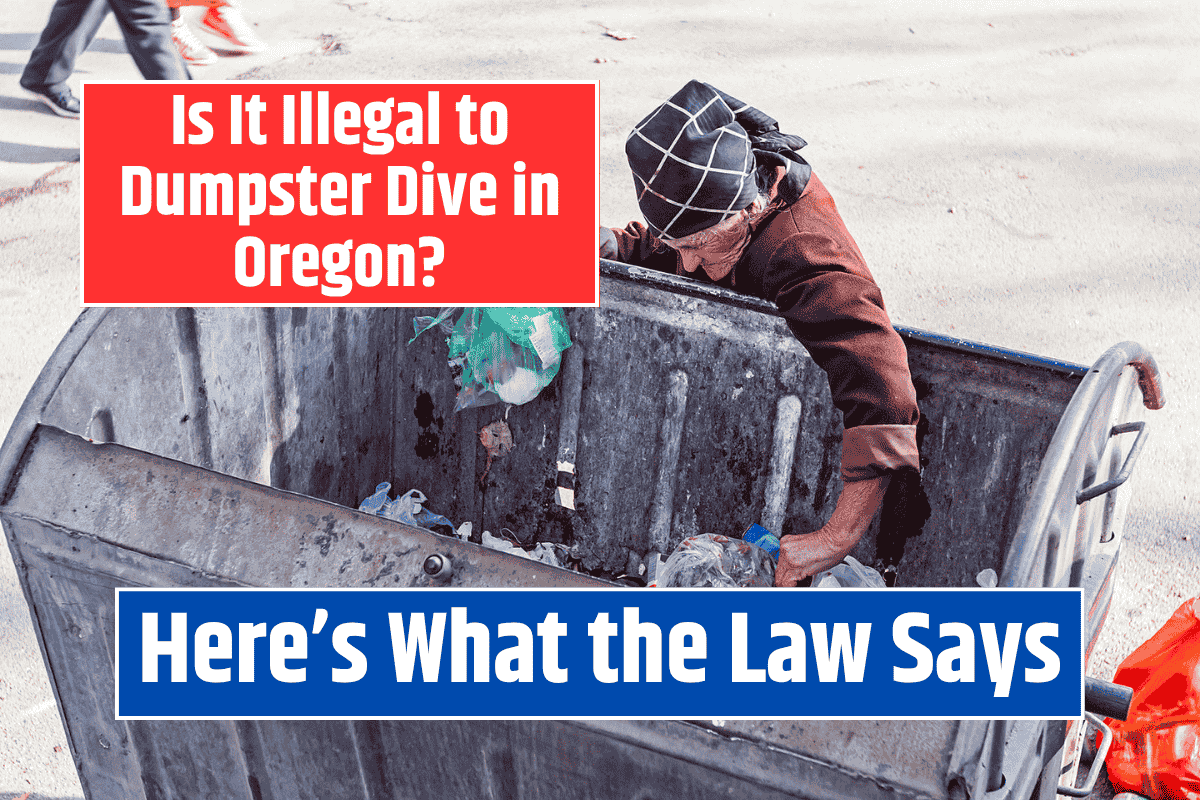In recent years, dumpster diving has become more common among people looking to reduce waste, find usable items, or even save money. But is it legal to go through someone else’s trash in Oregon? The short answer is yes, it is mostly legal — but only if you follow certain rules.
This guide explains what Oregon law says about dumpster diving, where it’s allowed, and what actions can get you into trouble.
What Is Dumpster Diving?
Dumpster diving simply means going through dumpsters or garbage bins to find things that have been thrown away but are still usable. People often search for items like food, furniture, electronics, or recyclables. While this might sound unusual to some, for many, it’s a way to reduce waste or get things for free. However, there are legal limits you must follow, especially in different towns and private properties.
What the Law Says About Dumpster Diving in Oregon
At the state level, there is no law in Oregon that directly bans dumpster diving. In fact, a 1988 U.S. Supreme Court decision (California v. Greenwood) said that once someone throws something away and places it in a public area, they give up their privacy rights over it.
This means that, in general, it is legal to take items from public dumpsters or trash bins in Oregon.
But that doesn’t mean you can dive into any dumpster without risk. There are important conditions you must follow.
1. Private Property and Trespassing
If a dumpster is on private land, like behind a shop, inside a fenced area, or near a home, then accessing it without permission could count as trespassing. Even if there is no fence, a “No Trespassing” sign is enough to make it illegal to enter.
Always avoid dumpsters that are:
Inside fenced or locked areas
Marked with “Private Property” or “No Trespassing” signs
Located behind private buildings or homes
Entering such areas without permission could lead to legal trouble, including fines or even arrest.
2. Don’t Take Recyclables or Bottles With Refund Value
Oregon has a strict Bottle Bill which gives money back for returned bottles and cans. This means bottles and cans with deposit value (usually 10 cents per item) are considered someone’s property until officially returned.
Taking deposit containers from:
Curbside recycling bins
Public recycling containers
Collection areas without permission
is considered illegal and may be treated as theft under Oregon law. Even if the bottles are sitting out for pickup, they are still owned by the person or the waste company until processed.
3. Follow Local City or County Rules
Some towns in Oregon have local rules that may ban scavenging, especially near waste centers or recycling stations. These rules can vary between cities and counties, so it’s important to check local ordinances before dumpster diving in a new area.
For example, some places may:
Fine people for taking items from city trash bins
Restrict access to dump yards
Prohibit diving during certain hours or near schools, hospitals, etc.
4. Be Respectful When Diving Near Businesses
If you plan to look through dumpsters behind a store or restaurant, it’s always best to ask for permission from the manager or staff. Many business owners don’t mind, especially if you’re polite and leave the area clean. But others may prefer you stay away. Respecting their choice helps avoid conflict or police involvement.
Summary of Dumpster Diving Laws in Oregon
Here’s a quick summary of what’s allowed and what’s not:
Legal if the dumpster is on public property and not blocked or signed against entry.
Illegal if you enter private property, fenced areas, or ignore “No Trespassing” signs.
Not allowed to take recyclables or deposit bottles from curbside bins.
May be restricted in certain towns or cities due to local regulations.
Dumpster diving in Oregon is legal in most cases, especially if done with care and respect for the law. You can legally look through dumpsters that are in public spaces, but you must always avoid trespassing and never take recyclables from bins that belong to others.
Before diving in a new area, it’s a good idea to check local rules or ask for permission from property owners. When done the right way, dumpster diving can help reduce waste and even offer useful items — all within legal boundaries.
[1] https://scrapsafari.com/dumpster-diving-in-oregon/
[2] https://worldpopulationreview.com/state-rankings/dumpster-diving-legal-states
[3] https://www.theenvironmentalblog.org/2025/04/is-dumpster-diving-legal/












